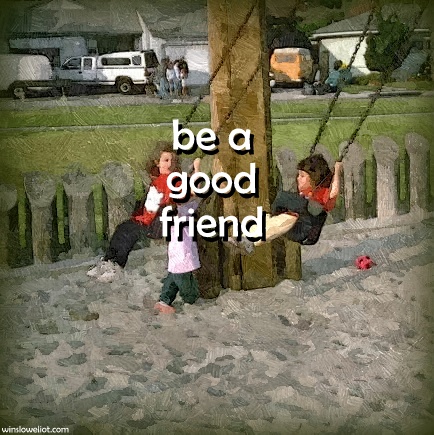 Friends show up in times of great sorrow or when we need a favor. They increase our pleasure when we’re on an adventure together. We can talk to our friends without fear of judgment or punishment. When asked, they’re willing to guide, succor, and support us. Friends weave in and out of our lives in mysterious ways. Sometimes a total stranger on an airplane feels like a friend we’ve known forever—and then we never see them again. Other times someone we’ve known for many years drifts away even if we live in the same town. Fights may occur, and they may or may not be resolved. Closeness can happen again after many years’ hiatus. Being a good friend doesn’t mean always being there, or calling on a weekly basis, or any other shoulds or assumptions or expectations. If someone tells you you’re not a good friend because you didn’t invite them to dinner last week, know that they’re talking to themselves about something else. Good friends don’t want you to be any different to the way you are. Good friends don’t need you to prove to them that you’re their friend. Good friends trust that the tapestry of friendship continues to create a lifetime of people who come in and out and in of our lives. As we get older, it can get harder to make new friends. Give yourself time and space for new activities and practices that connect you to new relationships. Welcome the stranger. Let yourself be surprised by the gift of new friendships. Friendship takes courage and love. It also takes trust: be ready for the unexpected. And, at the same time, allow the thread of a friendship from long ago to remain woven in your life, wherever that was. Trust that when it’s time it might show up again, as in a tapestry, but it doesn’t always have to be physically present. Every good friendship lives on in your heart, as memory or as promise or as mystery.
Friends show up in times of great sorrow or when we need a favor. They increase our pleasure when we’re on an adventure together. We can talk to our friends without fear of judgment or punishment. When asked, they’re willing to guide, succor, and support us. Friends weave in and out of our lives in mysterious ways. Sometimes a total stranger on an airplane feels like a friend we’ve known forever—and then we never see them again. Other times someone we’ve known for many years drifts away even if we live in the same town. Fights may occur, and they may or may not be resolved. Closeness can happen again after many years’ hiatus. Being a good friend doesn’t mean always being there, or calling on a weekly basis, or any other shoulds or assumptions or expectations. If someone tells you you’re not a good friend because you didn’t invite them to dinner last week, know that they’re talking to themselves about something else. Good friends don’t want you to be any different to the way you are. Good friends don’t need you to prove to them that you’re their friend. Good friends trust that the tapestry of friendship continues to create a lifetime of people who come in and out and in of our lives. As we get older, it can get harder to make new friends. Give yourself time and space for new activities and practices that connect you to new relationships. Welcome the stranger. Let yourself be surprised by the gift of new friendships. Friendship takes courage and love. It also takes trust: be ready for the unexpected. And, at the same time, allow the thread of a friendship from long ago to remain woven in your life, wherever that was. Trust that when it’s time it might show up again, as in a tapestry, but it doesn’t always have to be physically present. Every good friendship lives on in your heart, as memory or as promise or as mystery.
